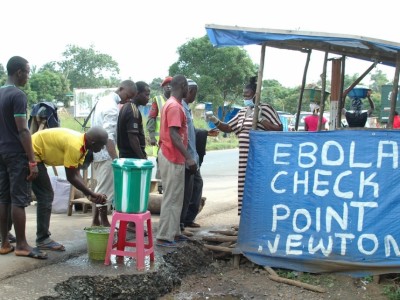社会人類学者及び社会学者のジニー・ムーニー氏が、エボラ流行が、いかにしてアフリカ人の社会性を奪っているか、を語る。
The way West-Africans care for their sick and deceased, supposedly differs significantly from that of the rest of the world. This is far from true. All over the world, the essence of care for the sick is practically the same: the touching of sick and dead relatives is a natural phenomenon. All over the world the deceased are cleaned up and the body is neatly laid out so that family members and acquaintances can say farewell. In the Netherlands, we have the possibility to lay out our dead loved ones in our parlour for days. And physical contact with the body of the deceased will take place until the coffin is sealed and put into the ground or taken to the cremation ovens.
In the case of the Ebola affected countries, normal human behavior is dismissed as “old-fashioned and undesirable practices” by the World Health Organization and experts analyzing the Ebola outbreak. Nobody questions whether it is reasonable to deny people the care for their loved ones and the right to be in charge of the mourning process. The solution to prevent people from getting infected with Ebola is clear: no touching, under any circumstances. More empathic solutions, like the provision of protective gear to family members so they can bury their loved ones themselves or with guidance, are not being considered. The population is pushed into the corner; if they do not cooperate, they will go to jail. These harsh measures alienate the people from the authorities even further. Ebola is a punishment. Not for the international community, not for the politicians, not for the elite, but only for the poor masses. The people feel alone. Deserted. Huge amounts of money are coming in, more and more reinforcements arrive and still the epidemic wins more ground every day….
西アフリカの人々が行う病人への看護や、死者の葬法は、他の国々とはおそらく違う。これは全くのデタラメである。世界各国で行われている病人への看護は、実際には本質的にほとんど変わらない。病人や遺体と、その家族が接触することは、ごく自然なことである。どの国でも遺体は清められ、安置されることで家族や知人は別れを告げることができる。オランダでは、大切な人の遺体を自宅の居間に安置し、数日を共にすることもありえるだろう。また、棺に納められ埋葬もしくは火葬されるまでは、物理的に遺体に触れたりすることもあるだろう。
エボラに侵された国々では、WHOとエボラ発生を分析する専門家たちが、現地の人々にとって伝統的な行為を、時代遅れで望ましくない慣習だとして、一蹴している。現地の人々は、病に冒された大切な人への看病をすることを否定され、哀悼の意を表する権利を奪われている。果たしてそれらは妥当なのか、誰も疑問を持たない。 人々がエボラに感染するのを防ぐ方法は明らかである。どんな状況下でも感染者に触れないことである。更に言えば、例えば感染者の家族に防護服の配給、もしくは埋葬に関して専門家の指導があれば、亡くなった大切な人々を、その家族が自分たちで埋葬することも出来る。しかし、その対策は全く検討されていない。現地の人々は窮地に追い込まれている。もし協力をしなければ、刑務所行きになるだろう。そこまで非情な手段に出た行政機関に対して、人々の不信は募るばかりだ。エボラは罰である。エボラは貧しい人々だけがかかる病気であり、国際社会、政治家、エリート層には無縁の病気なのである。市民は孤独感を抱く。見捨てられたのだ、と。日々、巨額の資金が投入され、どんどん支援物資が届く。しかし今日も感染は広がるばかりである・・・。






